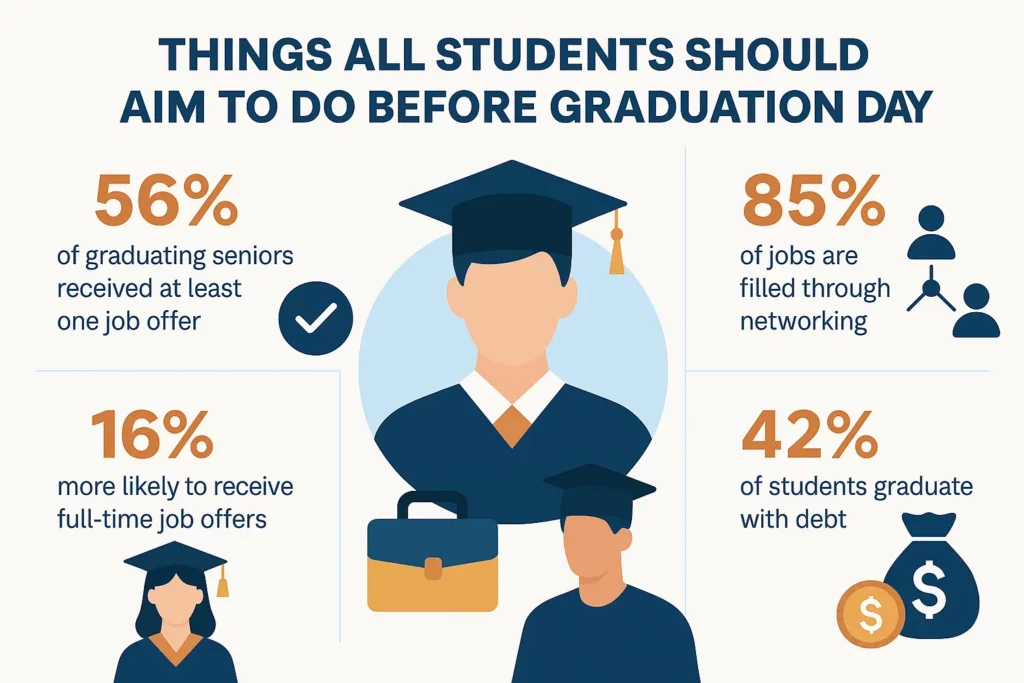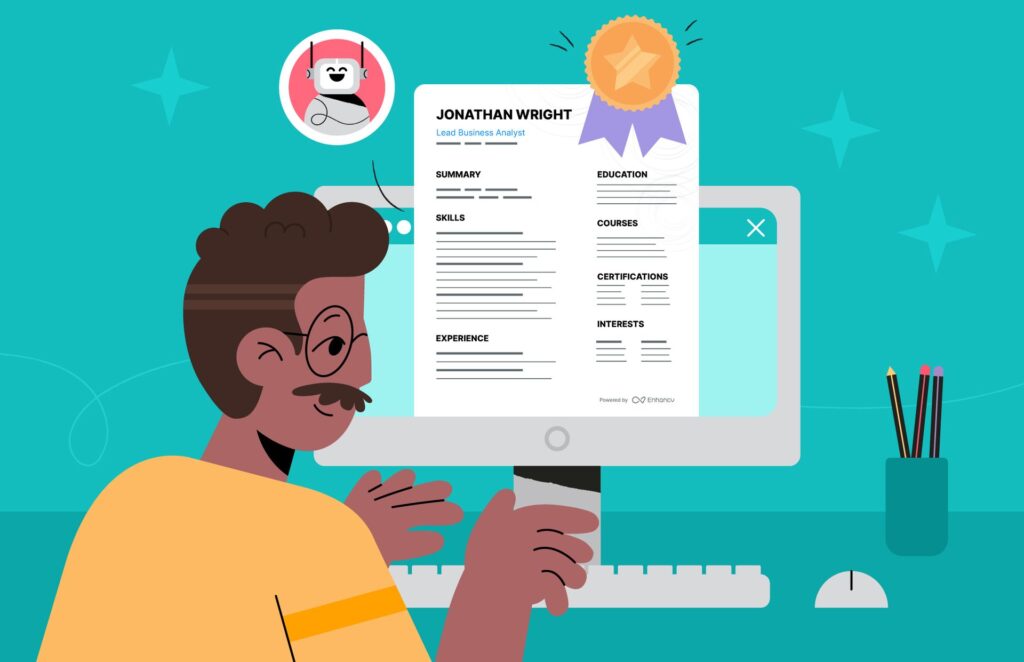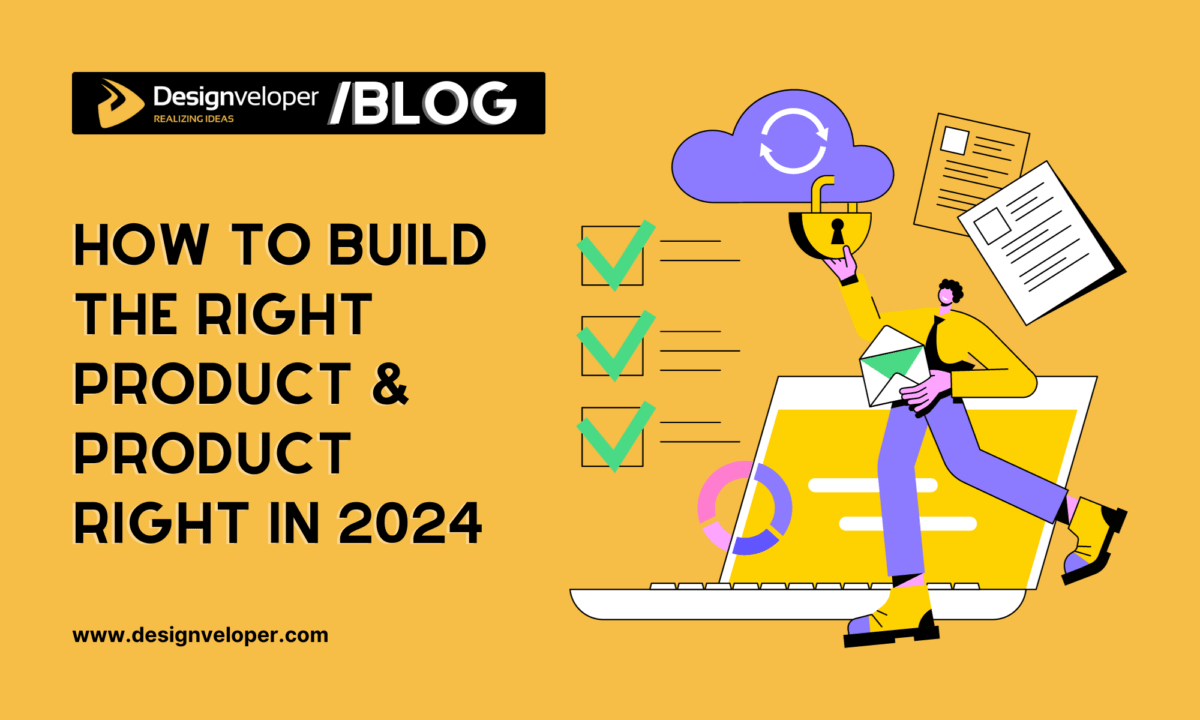5 Things All Students Should Aim To Do Before Graduation Day
April 17, 2025


As graduation day approaches, many students will understandably feel a mixture of stress and excitement. Leaving academia and entering the professional world is a big life transition, and as a graduating student, you may not know what to expect. But there are many things you can do to smooth this transition and prepare yourself for entering the workforce, even while you’re still finishing your last few subjects. In this article, we’ll explore five things to do before graduation that all students should aim to complete to help them prepare for securing a job and entering the workforce.
Things All Students Should Do Before Graduation
Graduation is a significant milestone, but preparing for life after college should start well before the ceremony. According to the National Association of Colleges and Employers (NACE), 67% of graduating seniors participated in at least one internship, with 57% of those being paid positions. Notably, 64% of these students expressed a likelihood to accept a full-time role with their internship employer, highlighting the importance of gaining real-world experience.

Building a robust professional network is equally crucial. A 2025 report by Go Beyond reveals that 85% of job vacancies are filled through networking, and 80% of professionals consider networking vital to their career success. Engaging in informational interviews, attending career fairs, and maintaining an active LinkedIn profile can significantly enhance job prospects.
In summary, students should focus on gaining practical experience, expanding their professional networks, and understanding their financial obligations to ensure a smooth transition into post-graduate life.
1. Build Your Resume
Once you graduate, your number one priority might be to secure employment. Most businesses require you to send in a resume detailing your skills and experience to be considered as a candidate in their hiring process. Luckily for you, there are many student CV templates available online that you can use. After choosing a template that’s suitable for your chosen profession, you can then fill it in with a detailed overview of your education, any professional experiences you’ve had and a list of industry-relevant skills you possess.

It’s also important to avoid some common resume mistakes that those new to the professional world sometimes make. These include wasting space on irrelevant job experience, adding an unprofessional email address and including too much personal information. Before you start sending out your resume to potential employers, it’s a good idea to have it evaluated by a career counsellor or another experienced professional.
2. Network Extensively
Among the greatest benefits of studying at a university is that it grants you countless opportunities to network. Whether it’s your peers, professors or even visiting speakers, make sure to build connections with a wide variety of people. The workforce is all about who you know, so having as many contacts as possible can only benefit you when looking for a job or starting your own enterprise. Plus, knowing more people means having a larger support network in your industry, which will definitely come in handy as you prepare for the challenges of post-college life.

Networking can understandably be intimidating, especially if you haven’t done it before. However, it’s not as hard as it might sound. You can build your network simply by striking up casual conversations with your peers and adding them on social media. Your classmates are probably looking to grow their contact lists, too, so they’ll likely be more than happy to chat.
You should also get to know your professors and guest speakers by regularly asking questions in class and talking with them afterwards (if their schedule allows it). Lecturers and tutors have plenty of experience in their fields and give you a wealth of advice on how to proceed with your career. Finally, take the time to attend networking events. Here, you’ll meet people who work or plan to work in your dream industry. You might even run into a recruiter or two at these events.
3. Plan Your Career Path
Finding your first job in your chosen career can be a confusing venture, especially if you don’t have much in the way of work experience. College is the perfect time to start thinking about your professional goals and how to get there. It can be helpful to speak with your school’s career counsellor, as they can help you map your career journey based on your interests and skills.

As soon as you know what field you’d like to work in, you should start looking into businesses you could potentially apply to. For example, if you’re knowledgeable about digital safety, you should look for some cybersecurity companies you can work for. Similarly, if you’re more artistically involved, you should start searching for employers in need of a graphic designer. When it comes to your career, it’s never too early to start planning or gaining industry-relevant experience. Make use of your school’s resources and the free time you have at your disposal to set goals and figure out how to achieve them.
4. Gain Work Experience
While your primary job as a student is to study, this doesn’t mean you can’t gain some valuable work experience on the side. There are several ways to do this. First, you can find an internship. If you choose the right business, an internship can give you knowledge and skills you’ll take with you throughout your career. Some other options include casual roles, freelancing positions and student jobs within the university.
Whatever job you end up choosing, it’s sure to be a massive boost to your resume. Employers prefer candidates who have already had some level of professional experience, even when hiring for entry-level roles. Working while in college also means that transitioning to becoming a full-time professional won’t come as a huge culture shock.
5. Hone Your Skills
Lastly, college should be a time of learning. Make the most of the different resources available to learn about a wide range of subjects and become an expert in those you find most interesting.

There are several ways to upskill while at university. The most obvious is to take classes. Another is to build connections with professors and guest speakers and pick their brains. These days, online learning is also an incredibly popular avenue for students to grow their skill sets. There’s an online course for almost anything: if you want to build websites for a living, for example, it’s extremely easy to find back-end developer courses on the Internet. Honing your skills while you’re still a student is a fantastic way to prepare for the world of full-time employment.
FURTHER READING: |
1. What is Big O Notation? |
2. Software Project Management Plan: Steps, Tips & Successful Cases |
3. What Is Quality Control? Short Guide About QC’s Responsibility |
Final Thoughts
Graduation day can be a daunting time for many students, but it doesn’t have to come without excitement, too. There are plenty of things you can do to maximise your remaining time as a student and prepare yourself for working life. In this piece, we’ve covered the top five things all students should do before graduating. If you’re one of the many young people on the verge of completing their education, try to apply some of the tips we’ve listed to hit the ground running as soon as you graduate.






Read more topics




























































